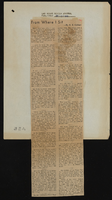Search the Special Collections and Archives Portal
Search Results
Otha Bolden oral history interview
Identifier
Abstract
Oral history interview with Otha Bolden conducted by an unknown interviewer on July 05, 1975 for the Ralph Roske Oral History Project on Early Las Vegas. Bolden discusses social and environmental changes that have taken place in Nevada over the span of twenty years. Her husband, Mr. Bolden also weighs in on the discussion, adding his personal accountant of the storm of 1964, and his views on integration and employment in Nevada.
Archival Collection
Dan Larkin oral history interview
Identifier
Abstract
Oral history interview with Dan Larkin conducted by Wallace Brown in 1974 for the Ralph Roske Oral History Project on Early Las Vegas. Larkin retells his memories of President Johnson visiting Las Vegas, Nevada, as well as different recreational activities that he participated in during the 1950s. The interview concludes with Larkin explaining how Las Vegas, Nevada has remained a tourism-centric town through the years.
Archival Collection

Transcript of interview with Rabbi Malcolm Cohen by Barbara Tabach, December 16, 2015
Date
Archival Collection
Description
In this interview, Rabbi Malcolm Cohen speaks about observed differences between British and American Jewish communities as well as new Temple Sinai initiatives to build community and engage younger congregants. Rabbi Cohen and his wife have two children, Elijah and Rachel.
Rabbi Malcolm Cohen was born on October 7, 1973 in London, England. He describes having the typical Reform Jewish upbringing of a second generation Londoner. His mother worked as an office assistant, and his father ran a bookshop and also prepared youth for their bar and bat mitzvahs. It was his father?s dedication to Jewish education and service that greatly influenced his career path. After earning a degree in psychology from Southampton University, Rabbi Cohen went on to get a professional qualification in youth and community work. He subsequently became the British Reform movement?s first outreach officer, leading the efforts to engage 20- and 30-year-olds to Judaism. At his wife, Sarah?s, encouragement, Rabbi Cohen enrolled in Leo Baeck College to become a rabbi. Upon finishing his studies in 2006, he got a job at West London Synagogue, a large Reform congregation, where he worked with a team of rabbis. In 2009, Rabbi Cohen took the position as Temple Sinai?s rabbi, where he has served ever since. In this interview, he speaks about observed differences between British and American Jewish communities as well as new Temple Sinai initiatives to build community and engage younger congregants. Rabbi Cohen and his wife have two children, Elijah and Rachel.
Text
David Sklansky oral history interview
Identifier
Abstract
Oral history interview with David Sklansky conducted by Claytee D. White on October 19, 2022 for the Boyer Early Las Vegas Oral History Project. Sklansky arrived in Las Vegas, Nevada in 1967. While in Las Vegas, he recalls working as the mathematical consultant to Bob Stupak for many years where he developed some of the games used in Stupak's Vegas World Casino. He also taught poker and gambling, and was entered in The Griffin Book which contained names and photographss of people who found ways to win in the casino by legal means.
Archival Collection

Transcript of interview with Gordon Christie by Larry DuRussel, June 30, 1975
Date
Archival Collection
Description
On June 30, 1975, Larry DuRussel interviewed carpenter Gordon Christie, (born March 9th, 1916 in Grand Rapids, Michigan) at his home in Las Vegas, Nevada. During this interview Gordon discusses having worked on the building of the MGM, Fremont Downtown, the Sahara Hotel, Desert Inn, and the Frontier Hotel, amongst others. Before becoming a carpenter, Gordon recalls working with his father at a furniture factory. He also discusses religion, politics, family life and the growth of Las Vegas.
Text
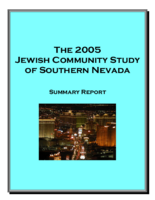
Jewish Community of Southern Nevada Summary Report of 2005, published 2007
Date
Archival Collection
Description
This study was conducted in 2005 to better understand the Jewish community in Southern Nevada. The themes of the study include population growth, population geographic shift and dispersal, Jewish youth, Jewish identity, increasing synagogue membership and general participation in Jewish causes.
Text
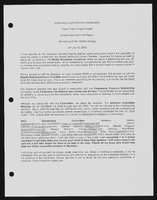
Alpha Kappa Alpha Sorority, Theta Theta Omega Chapter scholarship committee reports
Date
Archival Collection
Description
From the Alpha Kappa Alpha Sorority, Incorporated, Theta Theta Omega Chapter Records (MS-01014) -- Chapter records file.
Text
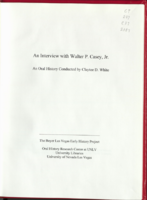
Transcript of interview with Walter P. Casey, Jr. by Claytee D. White, November 15, 2004 and January 13, 2005
Date
Archival Collection
Description
Text
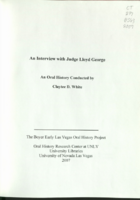
Transcript of interview with Judge Lloyd D. George by Claytee D. White, June 15, 2005
Date
Archival Collection
Description
Text

